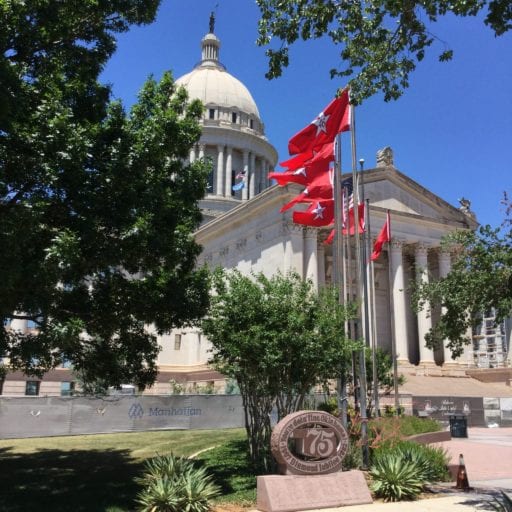BY DAVID PERRYMAN
 In 2004, the top Oklahoma individual income tax rate was 7%. Historically, the gross production tax rate for oil and gas severance was also 7%.
In 2004, the top Oklahoma individual income tax rate was 7%. Historically, the gross production tax rate for oil and gas severance was also 7%.
At those levels, funding was sufficient for school districts to comply with the class size limitations of HB 1017. Teachers were not rolling in dough, but were being paid a fair wage for a hard day’s work. Oklahoma children were being taught from up-to-date textbooks during a full five-day school week.
What has occurred in the intervening dozen years has not been good for students of Oklahoma’s public schools … or persons needing hospital care or mental health treatment … or seniors served through nutrition programs … or the developmentally disabled … or thousands of other citizens of our state, young and old who depend upon critical state services in some form or fashion.
Those are the results of a dozen years of cuts to Oklahoma’s gross production tax rate and income tax rates and the annual $1.4 billion decrease in state revenues. Not only are Oklahomans desperately feeling the impact of losing those revenues, many, like the state representative who authored income tax cuts and is now running for a statewide office, realize that those cuts were mistakes.
Virtually every citizen, every legislator, every lobbyist and every special interest group has an opinion about what course of action should be taken to right our budget.
Pure logic would tend to indicate that the quickest and best solution would be to undo the cuts that put us in these dire straits. However, the oil and gas industry has invested hundreds of thousands of dollars in the campaign donations to prevent ad valorem taxes from being assessed against minerals and to achieve an overall effective mineral/severance oil and gas tax rate of 3.2%.
Those campaign contributions and lobbying efforts have paid off. For the fiscal year ended June 30, 2016, a study funded by the state of Idaho found that an apples to apples comparison showed that while Oklahoma’s effective oil and gas tax rate was 3.2%, Idaho’s was 4%; Utah’s was 6.1%; Texas’ was 8.3%; North Dakota’s was 9.4%; Montana’s was 9.9%; Alaska’s was 12%; Louisiana’s was 13.2%; and Wyoming’s was 13.4%.
Over the past several months, efforts have intensified to stabilize Oklahoma’s budget crisis. In addition to a plan to just reinstate the tax rates on oil and gas companies and high income earners, a number of other plans have been put forth to fill the budget hole and provide recurring revenue so that cuts would not have to be an annually recurring fact.
Unfortunately, when the Democratic president from Missouri, Harry S. Truman, said, “It is amazing what you can accomplish when you do not care who gets the credit,” the transverse was true: “Nothing will get done if all a person cares about is who gets the credit.”
One of the earliest plans was Restore Oklahoma, a Democratic plan that compromised on a 5% GPT which together with other recurring revenue produced sufficient state revenue to plug the state’s $878 million budget hole, finance a significant teacher pay raise and balance the state’s budget.
A few months later, a bipartisan coalition of Oklahoma groups came together to present the Save Our State plan with its Blueprint for a Better Budget. It also provided for recurring revenue through a GPT rate of 7% and allowed teachers and state employees to have a raise.
Now, state Auditor Gary Jones has proposed a plan to increase the GPT to 5%, provide a 75-cent cigarette tax and a three-cent gasoline tax with a six-cent diesel tax. Auditor Jones plan would also provide a raise to teachers and state employees.
In addition to that Republican plan, there is a plan that has been submitted by the Oklahoma Council of Public Affairs that I and some of the other Democrats might support with a few tweaks. Another Republican plan that 82.2% of the Democrats supported was HB 1054 during the first special session. That bill contained enough revenue for a teacher pay raise and to date is the only plan that has garnered the required 75% or more support from a caucus.
The House speaker controls which proposal is voted on and when that vote takes place. The sooner the better and I firmly believe that it will pass so long as it doesn’t shift the tax burden from oil companies and high income earners to working Oklahomans and those citizens who can least afford it.
– David Perryman, a Chickasha Democrat, represents District 56 in the Oklahoma House







